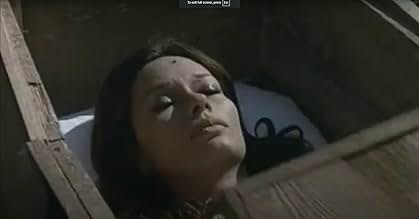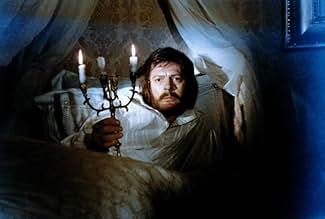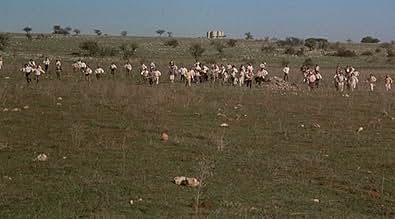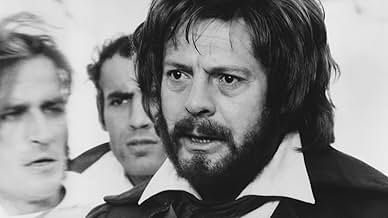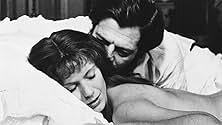Allonsanfàn
- 1974
- 1 h 55 min
AVALIAÇÃO DA IMDb
7,0/10
1,4 mil
SUA AVALIAÇÃO
Adicionar um enredo no seu idiomaA anarchist leader (Fulvio) wishes to retire, as he is old and tired. He tries to hide himself, but his friends find him and insist he carries on helping them.A anarchist leader (Fulvio) wishes to retire, as he is old and tired. He tries to hide himself, but his friends find him and insist he carries on helping them.A anarchist leader (Fulvio) wishes to retire, as he is old and tired. He tries to hide himself, but his friends find him and insist he carries on helping them.
- Direção
- Roteiristas
- Artistas
- Prêmios
- 3 indicações no total
- Direção
- Roteiristas
- Elenco e equipe completos
- Produção, bilheteria e muito mais no IMDbPro
Avaliações em destaque
It is my first encounter with Taviani brothers' work, my instant gut-feeling is that this surrealistic political-drama about a traitor's ill-fated fallout is perhaps blemished by the incompatibility of our generation, I reluctantly pigeonhole it to those films inevitably go astray from their glorious road along the unstoppable torrent of time!
Marcello Mastroianni this time around employs a substantially anti-hero persona opponent to his more audience-friendly role as the marquee Italian dream-lover. An abnormally bitter repugnance exudes from his character brims with all the screen time and I can sense a tint of misogyny levitating in the air with an inexplicably compelling thespian vibe. The lesser characters are all one-dimensional notwithstanding, a feral Lea Massari (from THE ADVENTURE) still could draw some attention for her very underdeveloped role.
All the sectors are somehow quirky enough to create certain discontinuity in the narrative, which could be a deliberate novelty at that time, but fails to leave sympathetic impression throughout, plus without the adequate stewing time, I might wonder it might be too hasty for audience to ruminate or even reflect the actual happening in the film, especially for a foreigner.
Marcello Mastroianni this time around employs a substantially anti-hero persona opponent to his more audience-friendly role as the marquee Italian dream-lover. An abnormally bitter repugnance exudes from his character brims with all the screen time and I can sense a tint of misogyny levitating in the air with an inexplicably compelling thespian vibe. The lesser characters are all one-dimensional notwithstanding, a feral Lea Massari (from THE ADVENTURE) still could draw some attention for her very underdeveloped role.
All the sectors are somehow quirky enough to create certain discontinuity in the narrative, which could be a deliberate novelty at that time, but fails to leave sympathetic impression throughout, plus without the adequate stewing time, I might wonder it might be too hasty for audience to ruminate or even reflect the actual happening in the film, especially for a foreigner.
Allonsanfan is one of those rare foreign language films about which dedicated viewers know a lot without having gotten a chance to see it. It is rather unfortunate that this classic film directed by Taviani brothers has neither been shown repeatedly on TV screens around the world nor its DVD is as easily available as that of "Braveheart".If we look closely at the productivity of Italian cinema,we will come to know that there is only an Italian film ("La nuit de Varennes" directed by Ettore Scola) which similar to it in terms of style and content.Allonsanfan is quite similar to a Hungarian auteur Miklos Jancso's film but with no nudity,no brutality and no humiliation.At the core of this film is a detailed description of the tough life of a determined revolutionary.Sometimes he is trusted by his followers, sometimes he is not.Family ties are of great importance for him as any other aristocrat.The only unusual aspect of his behavior is that he does not know how to maintain them.Betrayal is a repetitive element of this film as there are plenty of disloyal souls linked to our strongman.This is the reason why he fails to remain neither a true revolutionary nor a true aristocrat.The portrayal of incest is rather out of place for this film.It loses its credibility because of prevalence of dramatic situations.It is true that "Allonsanfan" is visually exquisite but it is somewhat difficult to follow the film's flow as not much of historical context is provided to the viewer.One can say that events happen of their own accord.It is only after reaching the halfway mark that viewers comprehend that Allonsanfan is one of the this film's important protagonists.A positive thing about it is its star cast with remarkable performances by Marcello Mastroianni.A must see for all the admirers of auteur cinema especially of Vittorio and Paulo Taviani.
The political prisoner Fulvio Imbriani (Marcello Mastroianni) is released ill from prison and the authorities expect to find his rebel friends though him. However, he returns to his family's real state and recovers his health with his siblings. When his lover Charlotte (Lea Massari) unexpectedly arrives in the property, she stays with Fulvio but his sister overhears Charlotte telling that their friends would be arriving on the next morning and calls the authorities. The soldiers kill a great number of revolutionaries but Fulvio escapes with Charlotte that was shot on the back. She dies and Fulvio travels with his comrades but without enthusiasm. Sooner he betrays the group, trying to flee to United States with the money of the revolutionaries and his new lover Francesca (Mimsy Farmer).
"Allonsanfàn" is boring story with a messy lead character and a terrible screenplay that is awfully developed. It is never clear where and when the story takes place; the characters come and go without any explanation or previous development – the viewer never knows who they are or their relationship; Fulvio's motives are confused and never clear, and it is never clear why this amoral bourgeois is a leader of the revolutionaries (or bandits?). There is one ridiculous scene with a frog where the directors are probably trying to give the status of cult to this overrated movie. My vote is four.
Title (Brazil): "Allonsanfan"
"Allonsanfàn" is boring story with a messy lead character and a terrible screenplay that is awfully developed. It is never clear where and when the story takes place; the characters come and go without any explanation or previous development – the viewer never knows who they are or their relationship; Fulvio's motives are confused and never clear, and it is never clear why this amoral bourgeois is a leader of the revolutionaries (or bandits?). There is one ridiculous scene with a frog where the directors are probably trying to give the status of cult to this overrated movie. My vote is four.
Title (Brazil): "Allonsanfan"
This movie is a quite open metaphor for the attitude of many leftists in Italy (and elsewhere) in the 70s. It's about Fulvio, a man who left his house and loving and wealthy family (and also an illegitimate son) in order to free the poor and oppressed and to become a full-time revolutionary agitator, and who - after only 3 months in prison and the suicide of a comrade - decides that it was all a mistake and that he should go back and live with his brother and sister in their villa, where he is pampered by old, mama-like servants, seeking happiness in family life. But his past thwarts his project, first when his ex-lover (an emancipated, passionate, Hungarian revolutionary woman, beautifully played by Lea Massari) appears at his home, mocking his family and shocking the servants with her manners, then when the whole bunch of revolutionary, Utopian friends of Fulvio tries to involve him in a crazy plan: initiate a revolution in poor, backward, oppressed Southern Italy. Fulvio gets involved in the plot against his will. The more he tries to get away from his former comrades, the more - ironically - he gets deep into the plot, till the sad, grotesque end. Taking place during the Restoration which followed the fall of Napoleon and seemed to mark the defeat of ideals created by the French Revolution, the movie is a bitter reflection about the fact that in everyone, even in the most revolutionary and idealist persons, there is a part which is counter-revolutionary and anti-idealistic. Fulvio is willing to betray his friends and comrades in order to live a quiet life, having lost every interest and hope in fighting injustice and oppression. It's a movie about political engagement and the following delusion, about a suicidal courage in pursuing ideas which are absolutely unrealizable and the cowardice of those who just want to enjoy life (as long as they are on the sunny side of it...), about individualism and blind dedication to THE cause and to the party/group/revolution etc. It's a sad movie in which the main figures oscillates between appeasement with the existing injustice (Fulvio's private, inner Restoration) and empty, finally pointless revolutionary beau gestes (like his comrades). We follow Fulvio and his friend from a lovely, rich Lombardy (with its villas, lakes, hills), in which men and Nature seem to harmonize perfectly, to a bare, sun battered countryside of Southern Italy (with its extremely poor towns), in which the unnaturally red jackets of the revolutionaries stand out as something which do not belong there at all. When still in Lombardy, Fulvio seeks villas and palaces, but his friends force him always to go to abandoned places, ruins, warehouses. They offer him nocturnal bivouacs instead of well furnished dining rooms like the one he brings once his illegitimate son. But they act in the name of an ideal, he in the name of his individual happiness. Is a conciliation of both motives possible? The ending of the movie seems to give a deluded, cynical answer to the question.
On the video box of Allonsafan, I noticed that someone had written in small letters, "Boreing". So, was it? On the whole, I am not the biggest fan of Italian films, and Marcello Mastrianni I always feel is his and miss. But actually, Ansofan isn't as bad a film that many people perceive it to be, although it essentially goes all over the place, the film is somewhat entertaining. Mastrianni is certainly OUT there playing a member of a criminal gang. He wants to go straight, but members of his gang keep showing up every time he's trying to go straight. He also has a son to think about! And his love life! Nevertheless, the gang members seem to follow him like a bad rash, even when he tries to kill the annoying pests. What this all is supposed to mean is rather confusing, and the ending is pretty predictable if you've been paying attention to this love/hate relationship thing Mastrionni has got going. Not entirely boring, but then again, not entirely comprehensible either.
Você sabia?
- CuriosidadesTitle derived from the first two words of the French national anthem.
- ConexõesEdited into Marcello, uma Vida Doce (2006)
Principais escolhas
Faça login para avaliar e ver a lista de recomendações personalizadas
- How long is Allonsanfan?Fornecido pela Alexa
Detalhes
Bilheteria
- Faturamento bruto mundial
- US$ 782
- Tempo de duração
- 1 h 55 min(115 min)
- Mixagem de som
- Proporção
- 1.85 : 1
Contribua para esta página
Sugerir uma alteração ou adicionar conteúdo ausente

